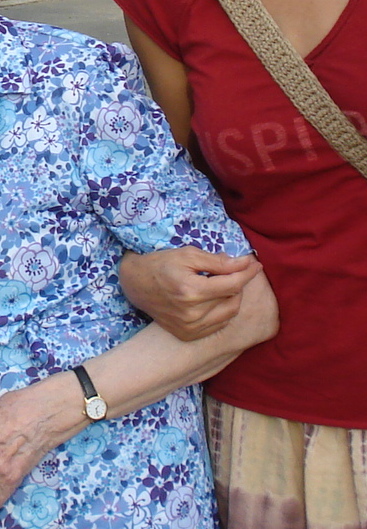I used to think Alzheimer's was all bad news.
My mother started showing signs of mental deterioration seven years ago. She managed to live alone for six more years, until her safety became a real issue, and my brother and I managed to convince her to move into an assisted living facility nearby. Needless to say, those six years were hard for all of us. Fear, powerlessness, frustration, grief, became our constant companions, as each day seemed to bring her further down the spiral of madness.
Today, I have a very different take.
Nothing has changed on my mother's end. Every moment in her life is still a struggle, and her memory lapses are becoming more and more pervasive. The good news comes from me, and the way in which I have been able to experience her differently, and become a healing presence for her, and for myself as well.
The good news can be summed up in one word: mindfulness.
Last year, spurred by a passage through the darkness, I resumed the mindfulness practice I had left behind long ago. I stopped identifying with my thoughts. I learned to embrace the complete reality of the present moment, whether pleasant or unpleasant. I ceased to run away from suffering, my own, and that of others. I started appreciating the impermanent nature of life, its constant ebbs and flows. And I learned to see the fluid nature of the personal self, and its dependence on outer experiences.
Using this new lens of mindfulness I started to welcome the daily phone calls with my mother, rather than dreading them, as before. No longer just a giver of care, I became the recipient of my mother's love and wisdom. The same thing has been happening during my weekly encounters with the older residents at Zen Hospice, many of them with dementia. This is the part most of us miss. People with Alzheimer's have a great deal to offer us in terms of heart intelligence. From them, we can learn:
to let go of our anxiety about the future,
to live in the moment,
to love without the taint of attachment,
to be real,
to play and laugh,
to not bring past resentments into the present,
to be spontaneous,
to not identify so much with our thoughts,
to not busy ourselves so much,
to open our hearts,
to slow down,
to be grateful for the small things,
to just be,
to free ourselves from judgments and opinions,
to venture into the bright field of spirit.
Of course, the question comes of how to enable that shift, from being a caregiver who only gives, to being a caring friend engaged in a fair, mutual, and sustainable exchange.
For answers, I turn to pioneers in the field of compassionate care. Zen Hospice Project, for one, has made mindfulness the cornerstone of its care training. We start each shift with a sitting meditation, followed by team sharing. At the bedside, we are taught to sit, breathe, and actively listen with all our senses, taking in our reality, and also the other person's reality. Our interaction with each resident becomes yet another mindfulness meditation, one that leaves us more whole afterwards. At the end, we sit together again, and share our experiences from the shift. We are also encouraged to spend a 'sixth hour' of doing nothing after we leave, to restore ourselves before we return to our lives. That's a lot of mindfulness practice and support, and probably the two main reasons why serving at Zen Hospice is such a joy, and why the residents there feel so loved.
This approach is echoed by Allen Power, in his excellent book 'Dementia Beyond Drugs':
'There are two keys to helping care partners achieve a positive approach in their daily interactions. The first is to create a strong support system for all who work within a given environment . . . The second key is for each person to develop a process that helps him or her to achieve a balanced, centered state of mind when things get hectic. There are several approaches, from meditation to deep breathing to biofeedback. The essential element is mindfulness-the ability to exist in the moment and attend to the feelings at hand in a nonjudgmental manner.'
It seems that most of the mindfulness training programs currently being studied for care partners - Allen Power's skillful substitute for traditional caregiver label - rely on Jon Kabat-Zinn's MBSR (Mindfulness-Based Stress Reduction) model. While a perfectly fine solution, I would like to suggest a less cookie-cutter approach. First, the substantial time commitment required by a standard 8-weeks MBSR program may be an additional source of stress for care partners, for whom time is already a precious resource. Second, the MBSR curriculum does not incorporate the particulars of the Alzheimer's caring relationship. I would like to suggest instead a hybrid model of training that combines elements of MBSR, Zen Hospice model of compassionate care, and William Thomas's Eden approach to elder and dementia care. Such a training program is yet to be created.
No need to wait for the drug companies to come up with miracle cures. No need to wait for the institutional care system to change. You and I can start to make a huge difference right now, by changing the way we are with ourselves, and the way we are with those who need our care. Practicing mindfulness, and remembering with the Rolling Stones:
You can't always get what you want,
but if you try sometimes well, you might find
you get what you need.
